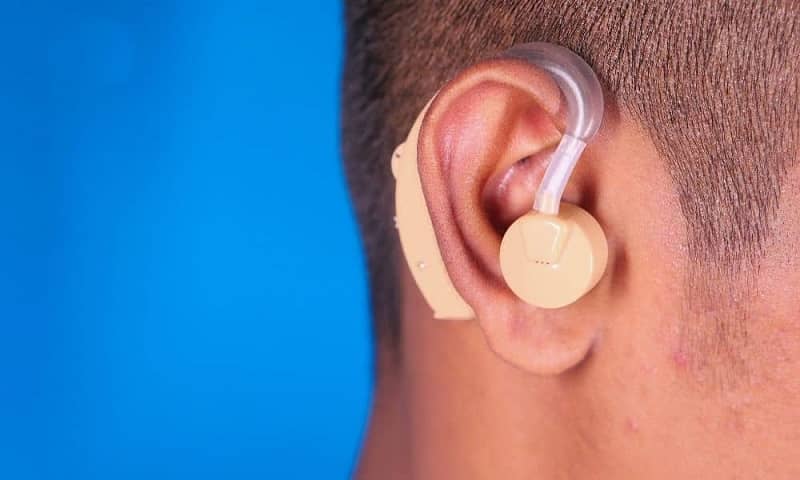
27 Dec Ringing in One Ear Only? – 7 Causes of Unilateral Tinnitus
Tinnitus is a common condition causing ringing or other sounds in one or both ears. But when the ringing occurs in only one ear, it is called unilateral tinnitus.
Well, the noise you listen to doesn’t come from an external source. Instead, it’s because of an underlying condition.
According to a statistic on tinnitus, almost 15% to 20% of folks experience it once in their lifetime. Another fact reveals the condition is common among older adults.
Well, various underlying factors can trigger sudden ringing in the ear. The most common causes include:
- hearing loss due to old age
- an ear injury
- an issue with the circulatory system
But, for most, the condition improves with proper treatment. In a way, it lessens the minute noise or makes it less noticeable.
However, what really determines the successful treatment is the right diagnosis of the causes of tinnitus in one ear only.
The Possible Causes of Tinnitus in One Ear Only [7 Reasons]
Some of the main reasons behind ringing in one ear only (unilateral tinnitus) can include:
- Loss of hearing
- Obstruction in the middle ear or auditory system
- Trauma in your head or neck
- Temporomandibular Joint Disorder (TMJ)
- Sinus pressure
- Traumatic Brain Injury (TBI)
- Ototoxic drugs or supplements
Constant tinnitus in one ear is a sign of a chronic condition. In this section, you’ll go through the details of the main causes behind ringing in one ear only.
#1. Sensorineural Hearing Loss
Tinnitus is a common early symptom of sensorineural hearing loss. However, some experts conform to a different thought.
They believe subjective tinnitus can’t occur without prior injury to the auditory system.
The main causes behind ringing in the left ear or right ear or in unilateral tinnitus due to hearing loss are:
- Aging: Presbycusis is the medical term for age-related hearing loss. With age, your natural hearing capacity faces a huge setback. Particularly, people post 60 experience the vicious impact of hearing loss. These are bilateral and affect both ears. It occurs due to sensory loss of higher frequency sounds. Indeed, this leads to ringing in one ear only or sometimes both.
- Noise: Noise-induced hearing loss is another reason behind this issue. Exposure to loud music or noise for a consistent period damages the auditory system. This leads to ringing in-ear as a result of tinnitus. You need to avoid traumatic noisy experiences, especially at the workplace or at events, for your sake. To sum up, high-frequency sound exposure for a long period triggers this common issue.
Apart from the above, you also need to look into some other causes of ringing in one ear.
#2. Blockage in the Middle Ear
Obstruction in your auditory system can cause mild ringing.
Indeed, if something blocks the ear canal, it causes pressure in the inner ear. As a result, the normal function of the eardrum is compromised.
The blockage near your eardrum can cause irritation as well. Again, this can lead to high-pitched ringing in the ears. The common middle ear obstructions include:
- Head congestion
- Dirt or foreign objects
- Hair loss from the ear canal
- Excessive ear wax (ceruminous)
In various situations, tinnitus symptoms lessen with the elimination of the obstruction. On the other hand, it may even lead to permanent damage causing chronic tinnitus.
#3. Head and Neck Injury
Intense injury to the neck and head interferes with various normal body functions. It negatively impacts your blood flow, nerves, and muscle tissue as well, resulting in moderate to high tinnitus.
Moreover, patients mention higher tinnitus volume with greater frequency and impact area.
This makes it one of the serious cases requiring urgent diagnosis. Experts use the term unilateral tinnitus in cases related to neck, head, or dental problems.
#4. Barometric Air Pressure With Sinus

Acute cold, flu, or sinus infection leads to nasal congestion. This develops unusual pressure in the middle ear.
Eventually, it affects the normal hearing ability leading to ringing in one ear.
Acute barotrauma occurs due to intense or rapid alteration in water or air pressure.
Similarly, it damages your middle and even inner ear causing tinnitus symptoms. Here are the prime triggers:
- Scuba
- Flying
- Diving
- Snorkeling
- Concussion from explosive blasts
Other causes of tinnitus in one ear only or unilateral tinnitus affect your hearing ability equally.
#5. Severe Traumatic Brain Injury (TBI)
Traumatic brain injury occurs as a result of concussive shock.
It can affect the natural ability of the auditory functioning area of your ear causing tinnitus symptoms.
TBI is the major factor behind ringing issues in the military and veterans.
Surprisingly, almost 60% of the cases are the result of mild-to-severe traumatic brain injuries, as per the reports of the U.S. Veterans Administration.
#6. Temporomandibular Joint Disorder (TMJ)
The temporomandibular joint (TMJ) is the meeting point of the lower jaw and the skull and is positioned in front of the ear.
Injury to any part of the joint can cause ringing in the right ear.
TMJ is yet another case of somatic tinnitus.
Furthermore, TMJ stays adjacent to the hearing system sharing some ligaments and nerve connections.
Patients with TMJ disorder experience tinnitus along with a painful face or jaw.
Moreover, it limits the movement of the jaw while making sounds while talking or chewing. In most cases, treatment of TMJ disorder alleviates the ringing symptoms and unilateral tinnitus.
#7. Ototoxic Drugs
Sometimes ringing affects your daily chores as nothing but side effects of a supplement.
In general, some drugs cause tinnitus as a side effect that could be acute and short-lived. Once the patient stops having the medication, the symptoms decimate naturally.
However, some ototoxic drugs may cause permanent tinnitus symptoms.
So, you need to avoid such medication overuse. Here are some of the medications that may perpetuate the condition:
- Specific antibiotics
- Diuretics and water pills
- Certain cancer supplementation
- Quinine-based medications
- Non-Steroidal Anti-Inflammatory Drugs (NSAIDs)
So, before adding any supplement to your routine, consult your doctor before having one.
All in all, these were some of the potential causes of tinnitus in one ear.
Still, one having tinnitus shouldn’t just think that they have any of the conditions mentioned above.
The underlying cause of your condition might slightly differ. In short, you should go for a proper diagnosis to understand the ringing in your right ear only.
Do not have time to read the entire post? Check out this short video!
The Treatments for Ringing in One Ear Only
Tinnitus doesn’t go away completely.
However, with treatment, the condition may get better. The rest depends on the decision of your specialist on the basis of the diagnosis of your system.
Let’s find out how to stop ringing in the ears due to tinnitus…
#1. Hearing Aids

These are applicable for people dealing with tinnitus as a result of hearing loss.
Having a hearing aid controls and helps adjust the sound level. This makes listening easier and issue-free.
As your hearing power becomes better, tinnitus lessens.
#2. Counseling
Talking to counselors helps you cope up with ringing in one ear only. The programs usually make you learn to live with the condition.
Experts help you understand what causes tinnitus in your ear. They may also help you think about it and respond to the ringing.
Of course, you may develop some action to make the noise less notable. This will help you relax and relieve, even benefiting your sleep cycle.
#3. Wearable Sound Generators
Like hearing aids, these are small electronic equipment.
You can fit them in your ear as they are soft. They produce delicate sounds masking the regular ringing sound.
Some go for complete masking, whereas others are just a little bit louder than the tinnitus sound. You can pick any random sounds.
#4. Tabletop Sound Generators
Likewise, these are small electronic aids for sleep and relaxation.
You can place them near your bed. They generate pleasant sounds of waterfalls, waves, rain, or summer night.
For people with tinnitus louder in one ear, this might be helpful.
#5. Acoustic Neural Stimulation
As a new tech, it is for people with permanent or loud tinnitus.
It includes a palm-sized electronic device and headphones to produce an acoustic signal embedded in music.
This tinnitus treatment stimulates alternation in the neural system in the brain.
It helps reduce or even shrink tinnitus. Surprisingly, experts have found it effective in lessening ringing in the ear.
#6. Cochlear Implants
This treatment is applicable for people with tinnitus and severe hearing loss.
Doctors use a cochlear implant to bypass the injured part of the inner ears. This sends electrical signals stimulating the auditory nerve.
Like other devices, it uses outside sounds to mask the ringing sounds.
Meanwhile, it stimulates alteration in the neural circuits. You can talk to your doctor for further understanding of this treatment option.
#7. Antidepressants and Anti-Anxiety Drugs
When ringing has anxiety-related triggers, your doctor might use this particular treatment.
They prescribe certain medications to improve your mood and sleep. Moreover, they can prescribe other medications as per your condition and symptoms.
As for now, these are the top treatments for tinnitus in one ear only.
Nonetheless, together you and your doctor may choose to go for any other treatment procedure, depending on your symptoms.
Here are some more details about the proper diagnosis of causes of tinnitus in one ear only.
Tinnitus Diagnosis
First, your doctor needs to understand one-sided tinnitus causes.
This helps him/her decide the best treatment for your condition. He will examine and evaluate the underlying causes.
Only on its basis, there will be a decision for any specific treatment.
In any case, the importance of a medical evaluation is paramount as it can help identify rare and life-threatening causes of tinnitus.
Indeed, you can get an evaluation from an otolaryngologist, or an ear, nose, and throat specialist.
Following are some questions that need answering before the diagnosis begins:
Q1: How or when did tinnitus start?
Q2: Are the sounds continuous, sporadic, or pulsating?
Q3: Have you suffered any dizziness or hearing loss?
Q4: Is there any pain, injury, or jaw clicking?
Q5: Have you been ill recently?
Q6: Were there any injuries or accidents?
Q7: Were you exposed to any loud music like rock concerts or explosives?
Only on the basis of your answers, the doctors may prescribe tests as well.
The tinnitus tests may include:
- hearing tests
- imaging studies
- laboratory blood tests
- a thorough examination of the ear, head, neck, and torso
The actual diagnosis may differ and include steps different from the ones mentioned above. As mentioned earlier, your doctor may go for a different diagnosis as per the tinnitus symptoms.
However, along with the causes of tinnitus in one ear, there are some risk factors too that need considering for a proper check-up.
Risk Factors of Tinnitus in One Ear Only
Pressure and ringing in one ear are common problems for many. However, some people are at greater risk due to some factors.
1. Extreme noise exposure from:
- work,
- concerts,
- headphones,
- or explosives.
2. Smoking
3. Hearing loss
4. Gender (men are at higher risk than women)
5. Age (older adults are at higher risk)
You can prevent tinnitus by cutting down noise exposure.
Also, quitting smoking is a healthy step.
If nothing works, you should consult with your doctor or specialist to get rid of the ringing in one ear only.
As a matter of fact, people struggle with constant tinnitus for years. They ask if they can ever get rid of the condition.
According to the findings, the answer is mixed.
ALSO READ: How to Know You Have Meniere’s Disease?
Does Tinnitus Go Away?
Ringing in the ear is an extremely common condition, especially for older people. A whole section of the adult population struggles from tinnitus in one ear or both.
Of course, everyone wants to get rid of the annoying condition. This depends on a lot of factors, though.
In general, tinnitus is treatable. You can get rid of the condition.
But the chances of self-resolution also depend on what caused the ringing in your ear in the first place.
Say, for instance, if the ringing in one ear only is due to accumulation of earwax, rest assured that clearing it will resolve the ringing.
But if the damage is permanent, it is less likely to be treated completely. However, some treatments can make the noise less noticeable.
Various hearing aids benefit the condition related to hearing loss as well.
On the other hand, a permanent tinnitus problem uses different electronic devices to fight off the issue.
These devices produce small music to mask tinnitus. In this way, they help you enjoy your life without annoyance.
So, yes, eliminating tinnitus is possible, but it depends on your symptoms. For other cases, an electronic aid can mask the noise to fight off the issue.
Our investigation on the “causes of tinnitus in one ear only” ends here. At last, have a look at our summed-up evaluation.
Concluding Note
Ringing is a very common issue in older adults. Almost everyone has suffered from it once in their life. But for some, it can become a daily struggle.
However, investigating the causing factors can help find the best treatment and can help get rid of tinnitus completely.
Most cases have an underlying factor behind the intense ringing issues. Nonetheless, you can consult with a doctor or specialist for proper treatment.
We are leaving you with some precautionary measures:
- Avoid loud noise exposure, such as loud sounds in the workplace, concert, or traffic
- Stop smoking
- Avoid exposure and overuse of air pods or your headphones
Now, we hope this article was helpful to you. For any further queries, feel free to leave your comments down below. And if you found the blog useful, don’t forget to hit the like button before leaving.



No Comments